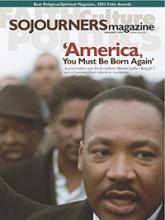When I was a college student considering how to respond to the Vietnam draft, Dietrich Bonhoeffers The Cost of Discipleship had an important impact on my thinking. For 35 years Ive continued to reflect on him, reading his theology, ethics, and numerous biographies. Now, in The Cost of Moral Leadership, Burton Nelson and Geffrey Kelly explore the spirituality that animated Bonhoeffers leadership in opposing Hitler and the Nazi regime.
From his first anti-Hitler sermon in 1933, days after Hitler became chancellor, through his leadership in the Confessing Church and his involvement in the conspiracy that resulted in his execution, Bonhoeffers political activity was based in trust in God, obedient discipleship to Jesus Christ, and the guidance of the Holy Spirit, all expressed in Christian community living in compassionate solidarity with the oppressed.
The book begins with his "Christocentric spirituality," his close and personal relationship with Christ. And it led, the authors write, to his feeling the empowerment of the Holy Spirit in "speaking truth to political and religious falsehood. One honors the Spirit of love by acts of compassion on behalf of those whom the agents of falsehood hate and oppress." This produced a spirituality of liberation lived in solidarity with the oppressed.
Read the Full Article
